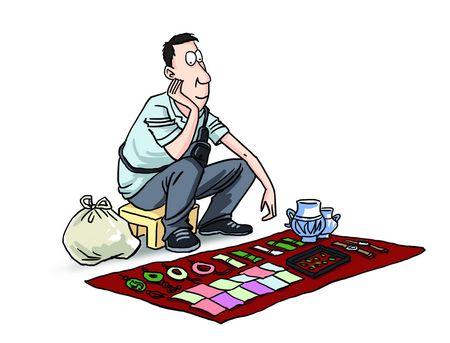Gray market spoils Chinese reputation in Russia
|
|
|
[By Liu Rui/Global Times] |
I have been engaged in Sino-Russian trade for 15 years and I feel that it is often blocked by a kind of misunderstanding. Many Chinese people think that Russians discriminate against Chinese goods and businessmen and that it's not safe to undertake trade with Russia.
Why do people have such an impression? Because in Russia's urban marketplaces, many Chinese businessmen operate illegally, which brings in a lot of uncertain factors and police attention.
But all we hear second-hand in China is that the business environment in Russia is very bad.
At the end of November, when Chinese Premier Wen Jiabao and Russian President Dmitry Medvedev met, Medvedev proposed that the two countries' trade volume should reach $100 billion as soon as possible. It's good news.
The US and Canada are not very populous compared to China, but their trade volume exceeds $600 billion. And the trade volume between China and South Korea is expected to amount to $300 billion by 2014. China and Russia share a 4,300-kilometer-long border, so it's really a pity that their trade volume is only $55.45 billion.
Many Russian friends told me earnestly that China and Russia need real international trade instead of covert transactions such as street vendors, illegal private banks, and urban marketplaces. Russia needs proper Chinese commodities and welcomes Chinese businessmen to run businesses legally.
Recently, one local Russian Chamber of Commerce organized a small purchasing group to visit China's Fujan and Guangdong provinces. They said that 4,000 Russian purchasers commissioned them to visit China and expected proper Chinese commodities to enter Russia through formal channels as early as possible.
Russian authorities have criticized the level of education of Chinese traders and workers in their country. Chinese commodities traded to Russia often go through the gray market rather than through proper channels.
It's not unusual for a Chinese T-shirt to be sold for 200 rubles ($7) in an urban marketplace, over 400 rubles in a mall and 4,000 rubles when it's passed off as an exclusive brand in a specialized shop.
If such long-standing illegal business practices are allowed to continue, Sino-Russian trade will stay small. We should value Russian opinions, since their feelings will play a role when making policy toward China.
In the early 1990s, Russian banks were highly insecure. The financial products market has now stabilized, but Chinese businessmen still don't trust Russian banks, and operate instead through illegal private banks of their own.
These kind of deals and the widespread gray market have destroyed the reputation of Chinese businessmen in Russia. We are still paying the highest costs for this crisis of credibility.
So now we must strengthen business ethics and emphasize proper branding. Some Chinese businessmen hold that it is troublesome for registered companies to pay taxes, hire accountants and lawyers and hand in report forms. That is how the gray market is maintained, but it only worsens the reputation of the whole Chinese business community in Russia.
Russia has a population of 100 million and has a huge demand for many items. The clothing import volume per capita is more than $600. Such market potential can hardly be found in other countries. But Russians value brands and are particular about quality.
So we should warn Chinese engaged in Sino-Russia trade to value quality and honesty, which are the biggest contributions they can make to help their own country.
Chinese State-owned enterprises have established the Greenwood International Trade Center, which provides a formal platform for Sino-Russia trade.
Doing things properly is better than wasting our country's reputation for a little short-term profit.
 0
0 








Go to Forum >>0 Comments